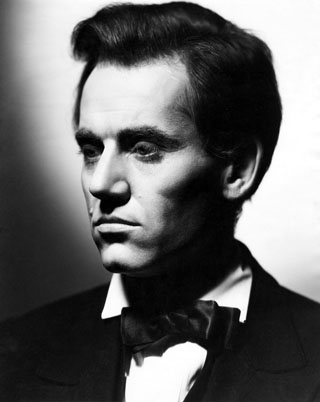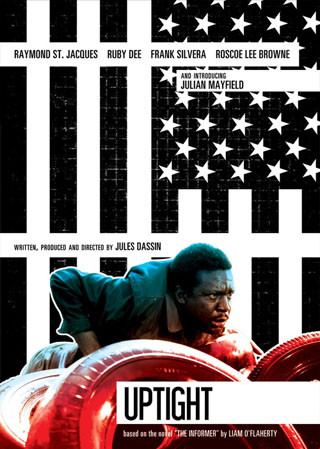You’ll find over 70 articles, images, video essays, what have you, between the virtual covers of the new issue of La Furia Umana, which opens with a note from the editors reminding us that a paper version of the multi-lingual journal is on the way. Issue 14 opens with a dossier on René Vautier edited by Nicole Brenez and features two more, one on Ida Lupino and Claire Denis, and the other on William Wellman, with contributions from Gina Telaroli, Daniel Kasman, David Phelps, Bertrand Tavernier, Maximilian Le Cain, Ted Fendt, Marie-Pierre Duhamel, J. Hoberman, and more. There are also homages to Chris Marker and Stephen Dwoskin, a piece from Ken Jacobs, the second part of a roundtable on the “post-cinematic,” and on, and on.
More reading. For Bookforum, James Gibbons reviews Devin McKinney’s The Man Who Saw a Ghost: The Life and Work of Henry Fonda, “both a biography and an often-brilliant feat of criticism. McKinney paints Fonda as a performing artist who continues to matter because of his lifelong reckoning with the darkest recesses of American history: ‘We’re encouraged, by our cultural heritage as much as our leaders, to forget the past. But Henry Fonda acts as if he has never forgotten anything.'” Related: Bill Routt in Screening the Past on John Ford‘s Young Mr. Lincoln (1939).
David Denby is back (see last Tuesday‘s and yesterday‘s entries). Today, he posts an entry at the New Yorker‘s Culture Desk called “Whatever Happened to Movies for Grownups?”: “As you may have figured out, I’m not made exactly happy by the way the business of movies is strangling the art and entertainment of movies. None of what I’m about to say is new, of course. It’s been true for 25 years, ever since the conglomerates tightened their grip on the studios. But it gets worse each year.”
Among those of us still engaging with his first piece, the longer rant in the New Republic, as well as with the rest of this year’s round of pronunciations of cinema’s death is Vadim Rizov, who actually grants Denby several points. But then: “What’s remarkable about [one of his arguments] is how quickly it moves from lamenting that some $30 million dreams go unrealized (free market capitalism’s a fickle patron of the arts) to the idea that the near-total absence of mass cultural dreams invalidates film’s more obscure achievements, and their lack of mass-viewing cachet in turn weakens the very medium itself. Denby uses ‘exfoliating’ to describe the films he marginalizes and those who love them: they’re dead skin. That’s fine and leaves my enjoyment of these instantly archaic objects intact.”
Meantime, at the Playlist, Oliver Lyttelton presents a timeline: “A Brief History of the Death of Cinema,” featuring Guy Debord, Jean-Luc Godard, Aki Kaurismäki, Peter Greenaway, and more.
In other news. And good news it is, actually, for several documentary filmmakers whose work you can watch here at Fandor. Laura Poitras, director of My Country, My Country (2006) and The Oath (2010), is one of the 23 MacArthur Fellows for 2012, each of whom receives a “genius grant” of $500K paid out over five years.
Among the winners of the of the 33rd Annual News and Documentary Emmy Awards are editors Per K. Kirkegaard, Per Sandholt, Sara Bøgh Jensen, and Chris White for their work on Armadillo, and Lixin Fan whose Last Train Home has won two awards, one for Best Documentary, the other for Outstanding Business and Economic Reporting (Long Form).
One more. In 2004, when the Republican National Convention was held in NYC, there were, you may remember, mass arrests of protestors, journalists, and what Clemenza famously called “pain-in-the-ass innocent bystanders.” Some of the arrested sued the City of New York, and this is the subject of Mark Schiller‘s doc The After Party. Yesterday, District Judge Richard J. Sullivan that the arrests that took place at one location, Fulton Street, were illegal and that all the fingerprinting was illegal. I don’t have a link for you as yet, but: Good news.
New York. Phil Solomon will be at the Museum of the Moving Image tomorrow to present several of his short films. His monumental three-projector installation American Falls is currently on view there as well (through November 25), and, for Moving Image Source, Genevieve Yue writes that “Solomon’s recent turn to the gallery is remarkable for happening long after his reputation as an experimental filmmaker had been firmly established. The avant-garde film community has remained notoriously isolated from contemporary art, though in recent years a number of practitioners, particularly younger filmmakers like Michael Robinson and Ben Russell, have, like Solomon, embraced new materials and exhibition spaces, suggesting that this hermetic world may be opening up.”
DVD/Blu-ray. “Criterion keeps pushing the boundaries of the cannon with their DVDs,” writes J. Hoberman at Artinfo, “Kino Lorber’s catalog mixes silent classics with recent documentaries, but the DVDs released by Chicago-based Olive are all over the map and totally unexpected—this week from outer left field, Jules Dassin’s long-unavailable, 1968 flop Up Tight. The blacklisted director returned from a 15-year European exile to transpose Liam O’Flaherty’s novel The Informer (adapted by John Ford in 1935) to the slums of Cleveland; scored by Booker T and the MGs, the dramas is played by a virtually all-black cast with a Black Panther-like revolutionary cadre substituted for the Irish Republican Army. The movie which Dassin not only directed but produced and wrote in collaboration with actress Ruby Dee and novelist Julian Mayfield (himself returned from Ghanaian self-exile) who also stars as the cell’s tormented turncoat, has a fierce urgency.”
Recently posted in Criterion’s Current: Steve Erickson on Wong Kar-wai‘s In the Mood for Love (2000) and David Ehrenstein on Paul Bartel’s Eating Raoul (1982).
In the works. For Vulture, Katie Van Syckle “couldn’t help but grill” Richard Linklater “about Before Midnight, the threequel to Before Sunrise that he shot on the down low with Ethan Hawke and Julie Delpy this past summer.”
Linklater’s also setting up a film “about a guy who gives up everything to be a professional bowler,” according to Jack Black in Steven Zeitchik‘s interview with him for the Los Angeles Times. Black, who’d play the 50-ish character based on a real-life bowler, has, of course, worked with Linklater twice before on School of Rock (2003) and Bernie (2011).
As for Black’s other project, Charlie Kaufman’s Frank or Francis, a musical Hollywood satire, it’s about $10 million short of getting off the ground, reports the Playlist‘s Kevin Jagernauth.
Eddie Marsan, Shirley Henderson, Sean Harris, Kaya Scodelario, and Rory Kinnear are among those cast in Sean Durkin’s (Martha Marcy May Marlene) Southcliffe, a four-part television drama for Britain’s Channel 4, reports Joe Cunningham at the Playlist.
Viewing (15’37”). REFRAME[D] presents an interview with Rosalind Galt, author of PRETTY: Film and the Decorative Image, by Catherine Grant.
For news and tips throughout the day every day, follow @KeyframeDaily on Twitter and/or the RSS feed. Get Keyframe Daily in your inbox by signing in at fandor.com/daily.





